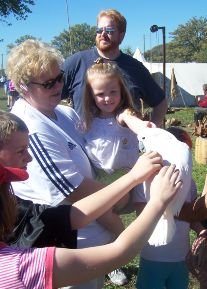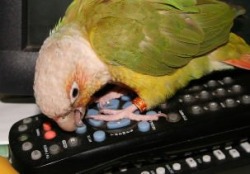Loading
Socialization – a Vital First Step When Training Your Parrot – Part 1
Hello, Frank Indiviglio here. Budgerigars, Lovebirds, Amazons, Macaws Cockatoos and other parrots are so intelligent that it is tempting to train them to speak and perform tricks right away. However, socialization must come first, as un-socialized birds are virtually impossible to work with.
Socialization is the process of introducing the parrot to the world around it, so that the bird will accept its surroundings and react positively to the people and things that come in to its life. Socialized birds also accept reasonable changes in their environment without experiencing undue stress.
Socialization in the Wild Young
Free-living parrots spend a great deal of time being schooled by their parents in the ways of their world. While they are born with many instincts, much of what they need to survive must be learned – how and where to forage, distinguishing predators from harmless species, adjusting to novel stimuli (unexpected weather patterns, the loss of a nesting tree, etc.) and so on.
Even when fully mature, parrots continue to learn from their mates and the members of their flock. Longer-lived species, and those that live in close association with people, generally undergo the most complex learning and socialization periods.
Socialization is the process of introducing the parrot to the world around it, so that the bird will accept its surroundings and react positively to the people and things that come in to its life. Socialized birds also accept reasonable changes in their environment without experiencing undue stress.
Socialization in the Wild Young
Free-living parrots spend a great deal of time being schooled by their parents in the ways of their world. While they are born with many instincts, much of what they need to survive must be learned – how and where to forage, distinguishing predators from harmless species, adjusting to novel stimuli (unexpected weather patterns, the loss of a nesting tree, etc.) and so on.
Even when fully mature, parrots continue to learn from their mates and the members of their flock. Longer-lived species, and those that live in close association with people, generally undergo the most complex learning and socialization periods.
Socializing Pets
While cages, people, dogs, food bowls, rooms that become suddenly flooded with light, car alarms and other such things are perfectly normal to us, parrots have no instinctive or learned “frame of reference” for them…becoming familiar with everyday events and sounds is an important part of the parrot-socialization process.
Health and Behavioural Concerns
Being quite intelligent and possessed of strong survival instincts, parrots often adjust to captivity without specifically being socialized, but such individuals generally live quite stressful lives, and are difficult to approach and bond with. Another serious problem is that un-socialized parrots are rarely confident enough to explore their environments, try new toys and behaviours, or interact with people. This is disastrous for such highly complex, active creatures, and usually leads to boredome, agression and undesireable behaviours such as excessive screaming and feather plucking.
Unsocialized parrots are also extremely stressed by the changes that invariably enter their lives - a pet sitter, house repairs, a new family member or a move to a new home may tax their immune systems and set them up for illness and disease.
Next time we'll look at some socialization techniques. Until then, please write in with your questions and comments.
Thanks,
Frank Indiviglio
Direct link to post: http://blogs.thatpetplace.com/thatbirdblog/2010/06/08/socialization-a-vital-first-step-when-training-your-parrot-part-1/
While cages, people, dogs, food bowls, rooms that become suddenly flooded with light, car alarms and other such things are perfectly normal to us, parrots have no instinctive or learned “frame of reference” for them…becoming familiar with everyday events and sounds is an important part of the parrot-socialization process.
Health and Behavioural Concerns
Being quite intelligent and possessed of strong survival instincts, parrots often adjust to captivity without specifically being socialized, but such individuals generally live quite stressful lives, and are difficult to approach and bond with. Another serious problem is that un-socialized parrots are rarely confident enough to explore their environments, try new toys and behaviours, or interact with people. This is disastrous for such highly complex, active creatures, and usually leads to boredome, agression and undesireable behaviours such as excessive screaming and feather plucking.
Unsocialized parrots are also extremely stressed by the changes that invariably enter their lives - a pet sitter, house repairs, a new family member or a move to a new home may tax their immune systems and set them up for illness and disease.
Next time we'll look at some socialization techniques. Until then, please write in with your questions and comments.
Thanks,
Frank Indiviglio
Direct link to post: http://blogs.thatpetplace.com/thatbirdblog/2010/06/08/socialization-a-vital-first-step-when-training-your-parrot-part-1/
ThatBirdBlog
Loading


